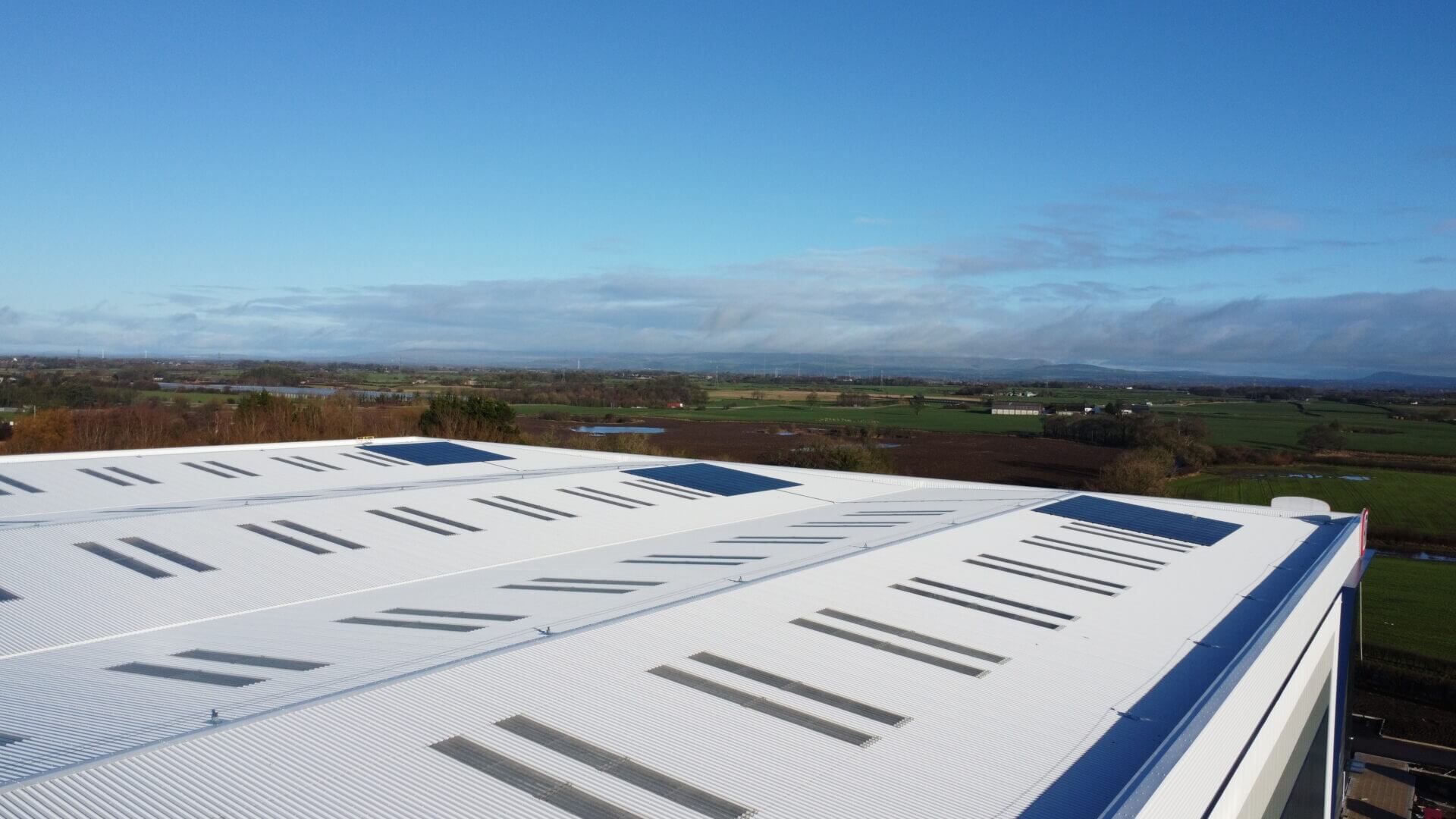The UK is experiencing more extreme weather events, placing additional strain on our ageing power infrastructure. Energy prices continue to rise, and communities need reliable, affordable, and sustainable sources of power. Solar microgrids offer a promising solution.
What Is A Solar Microgrid?
A solar microgrid is a local energy system. It uses solar panels, battery storage, and smart controllers. They ensure a steady power supply, even during outages.
Key components include:
- Solar PV panels to generate electricity
- Battery storage to store excess energy
- Smart controllers and inverters to manage energy flow and optimise performance
Microgrids can be designed to meet the energy needs of specific commercial warehouses or groups of industrial and office units. This makes them great for public services.
Keeping Public Services Operational During Crises
Public services such as schools, hospitals, minor injury units and emergency services are vital to community well-being. During extreme weather events, these institutions must remain operational. Solar microgrids can ensure they do.
Schools
- Continuous care: A solar microgrid can provide lighting, heating, and communication even when there is a power cut.
- Uninterrupted Learning: Learning can remain accessible, minimising educational disruption.
Hospitals & surgeries
- Continuous Care: Doctor surgeries and hospitals rely on electricity for medical equipment and refrigeration of medicines. Solar microgrids would ensure these services continue without interruption.
- Remote Areas: In rural or underserved areas, where grid access may be limited, microgrids offer a reliable power solution.

Emergency Services
- Operational Continuity: Police stations and fire stations depend on uninterrupted power for communication and operations. Microgrids can help maintain these capabilities during crises.
- Reduced Reliance on Diesel Generators: Microgrids reduce the need for noisy, fuel-dependent backup generators. Emergency Services
Environmental & Economic Benefits
While resilience is a primary driver for adopting solar microgrids, the environmental and financial incentives are equally of interest.
Environmental Sustainability
- Reduced Carbon Emissions: Solar power significantly lowers carbon emissions compared to fossil-fuel-based power.
- Decreased Air Pollution: Microgrids reduce reliance on diesel generators, which contribute to air pollution and greenhouse gases.
Long-Term Cost Savings
- Lower Energy Bills: Microgrids can offer decades of energy savings through lower energy bills.
- Available Funding: There are often UK-based grants and funding schemes available to support the deployment of solar microgrids in public services. Speak to EcoSolar to find out what’s available.
Grid Relief and Decentralisation
- Reduced Stress on Centralised Infrastructure: Microgrids help alleviate pressure on the National Grid during peak demand periods.
- Enhanced Grid Stability: They support broader grid stability by operating independently during outages or feeding surplus power back into the grid when connected.

UK government schemes provide funding for solar microgrid projects:
- Great British Energy (GB Energy) Scheme: Eleven schools currently have installed solar panels with the backing of Great British Energy. However, only around 20% of schools across the UK have solar panels installed, despite the significant potential for savings and sustainability gains. With solar and complementary technologies such as battery storage, a typical school could save up to £25,000 annually on energy bills.
- This investment supports the government’s broader clean power mission and forms part of Great British Energy’s first local initiative, kickstarting the Local Power Plan. The scheme ensures that the benefits of the clean energy transition, from lower bills to job creation and community resilience are felt at every level.
- Business Energy Advice Service (BEAS) is a pilot programme designed to help businesses save money and drive growth by providing free energy assessments and 50% match-funded grants up to £100,000. The government have allocated 2.6 billion for applications up to March 2026 when the scheme will be reviewed.
Regions running BEAS Within the West Midlands Combined Authority area, this includes Birmingham, Solihull, Sandwell, Dudley, Walsall, Wolverhampton and Coventry. Outside the West Midlands Combined Authority area, this includes Staffordshire and Stoke-on-Trent, Warwickshire, Worcestershire and The Marches (Herefordshire, Shropshire, Telford and Wrekin).
Business eligibility criteria.
To qualify for the BEAS programme users must:
-
- Must Classify as an SME. Have fewer than 250 employees and a turnoverless than £42 million, or balance sheet total less than £36 million. To qualify for the BEAS programme users must:
- Have an annual energy consumption of at least 25,000 KWh. Businesses must use at least 25,000 kilowatt-hours (kWh) of energy (electricity and/or gas) within 12 months. This varies from business to business, depending on energy usage and rates.
- Be a commercial entity/profit-seeking enterprise. This includes partnerships with various business structures, such as startups, limited companies, and Community Interest Companies (CIC).
- Operate from a commercial address for at least 12 months. Your address must be used for business activities and registered with a Company House Number for Limited Companies or a Company Registration Number (CRN) for CICs. Your business mustnot operate from a residential address.
- Responsibility for paying the business’s energy bills. The individual or business entity is responsible for energy payments. Must be officially registered/active for at least 12 monthsand there should be evidence of income, expenses, or transactions over the period.
Addressing Climate Challenges With Solar Microgrids
The UK is experiencing more frequent and intense extreme weather events. In 2024, the country had its fourth warmest year on record, with notable events including:
- Storms and Flooding: Widespread flooding in early January, associated with storms. October 2023 to March 2024 was the wettest winter on record for England and Wales in at least 250 years.
- Heatwaves: Record-breaking extreme heat events, with scientists stating that extreme heat is now the norm in the UK.
These events highlight the urgent need for resilient infrastructure. Solar microgrids provide a practical solution, ensuring that public services can continue to operate during such crises.
The Path Forward
The future energy systems must be resilient, sustainable, and community-focused. Solar microgrids are a great opportunity for achieving these goals, especially for public services that support the community.
Investing in solar microgrids for schools, surgeries, and other services helps us prepare for emergencies. It also builds energy independence and strengthens the local community.

